Iranian Opposition Figures Urge Designation Of IRGC AS Terror Group
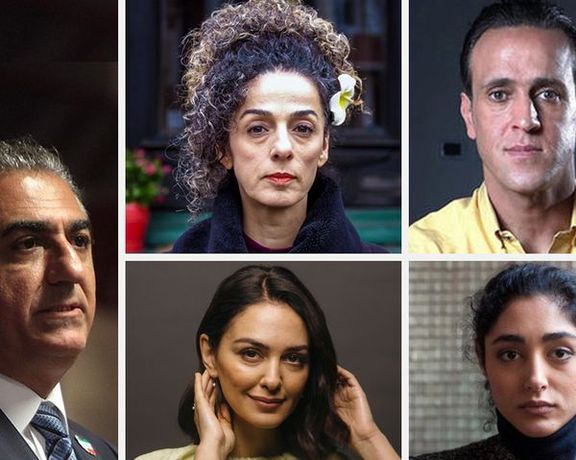
In a joint message, prominent opponents of the Islamic Republic have urged the international community to list Iran's Revolutionary Guard as a terror group.

In a joint message, prominent opponents of the Islamic Republic have urged the international community to list Iran's Revolutionary Guard as a terror group.
In a tweet published by exiled Prince Reza Pahlavi, football legend Ali Karimi, British-Iranian actress and human rights activist Nazanin Boniadi, journalist and activist Masih Alinejad, and actress Golshifteh Farahani they said, “our request for the international community is clear: put the IRGC on the terrorist list.”
"For more than four decades, the IRGC has been terrorizing and killing civilians inside and outside Iran," the five prominent opposition figures said in their joint tweet.
In the meantime, diaspora Iranians in Europe are gathering in Strasbourg, France Monday in front of the European Parliament to call on European Union governments to include the IRGC in the list of terrorist groups.
Videos sent to Iran International show that Iranians opposing the Islamic Republic who live in various European cities are moving towards Strasbourg, the seat of the European Parliament.
Meanwhile, the Association of Families of Flight PS752 Victims, in a statement, supported the demand from the European Union to designate the IRGC as a terrorist organization and declared that this organization is a terrorist one and should be recognized as such by the international community.
On January 8, 2020, the IRGC fired two missiles at a Ukrainian plane taking off from Tehran killing all its 176 passengers and crew.
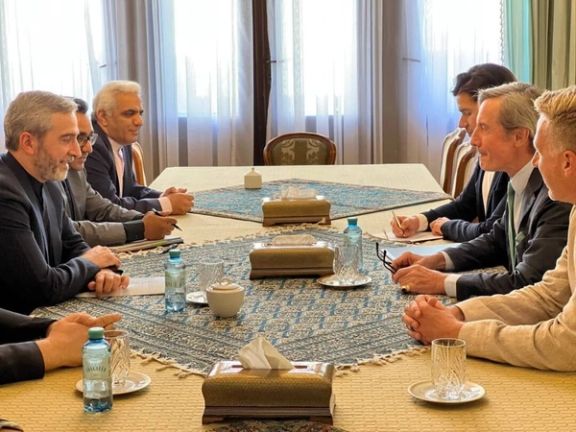
Two members of Iran's Expediency Council have called on the government to return to nuclear talks in a bid to evade the dangerous consequences of sanctions.
Mohammad Sadr has said in an interview with reformist daily Etemad that he had warned the Supreme Council of National Security and the heads of the three branches of the government about the adverse effects of failing to lift the sanctions on Iran's economy.
Sadr further told Etemad: "[President Ebrahim] Raisi told me that he has ordered his men to go ahead and further the negotiations, but he also said that there is serious opposition to the JCPOA in Iran by some security forces, those who benefit from the sanctions, and those who do not understand foreign relations."
Accusations that those who make money from sanctions by illicit trade or money laundering are not new, but it is the first time that Raisi has reportedly admitted it.
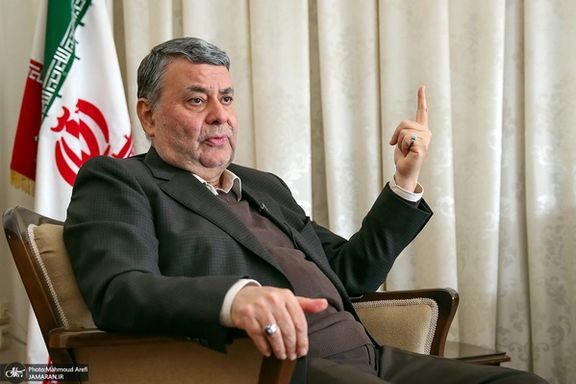
Meanwhile, in an interview with moderate conservative website Khabar Online, another Expediency Council member Gholamreza Mesbahi Moghaddam has also called on the Iranian government to resume the talks with Western governments to revive the JCPOA as the sanctions prevent foreign investments in Iran.
Both political figures also talked about the impact of Iran's involvement in the war in Ukraine. Sadr said: "Iran's impartiality in the war in Ukraine has been questioned. Peoples and governments in other countries are opposing Iran. Iran's foreign policy has not been successful, and the country's international status is weakening." Sadr added that "Iran should watch out for further diplomatic and international sanctions. The situation for Iran is very dangerous at international level particularly after the executions that have taken place."
Mesbahi Moghaddam on the other hand said that Iran should seek concessions from Russia as Moscow needs Iran to open a corridor to facilitate foreign trade as a country that needs to circumvent international sanctions.
Sadr noted that the United States has even accused Iran of committing a war crime by giving drones to Russia. At the same time, he added that the continuation of protests in Iran and the execution of several protesters has led more foreign pressures on Tehran. All of this, he said, has made an agreement with the West harder than ever before. Sadr further described the situation as an all-out economic, political and propaganda war against Iran.
He also pointed out that the regime needs to bring about a series of reforms, otherwise, it would be hardly able to properly respond to the ensuing consequences. Sadr added that Iran needs to adopt a realistic foreign policy. He pointed out that Tehran’s negotiating team has lost many precious opportunities because of the wrong policies it has pursued so far.
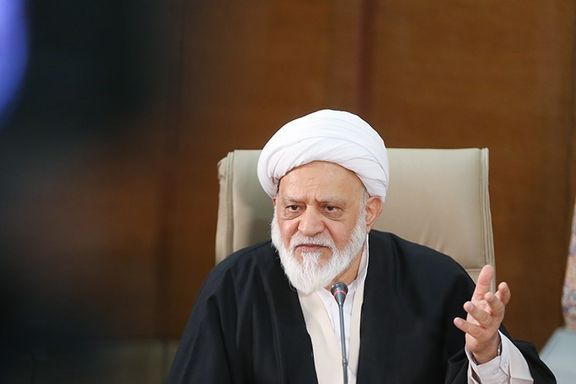
Politicians in Iran who criticize the government hardly ever mention that Supreme Leader Ali Khamenei has the last word in all major decisions, especially in foreign policy.
Sadr further pointed out that if the sanctions continue, the economic situation will worsen, and officials should stop the rhetoric about solving economic problems without an agreement over the nuclear program.
"I have talked about this with President Raisi and he is aware that a heavy pressure will be exerted on him if the problem of the JCPOA is not solved," he said, adding that some 30 percent of Iranians are already living in poverty. Some Iranians can no longer afford buying milk and fruits as inflation rises on a dayly basis.
He also warned that if executions and violation of human rights continue a dangerous international situation may occur for Iran and many countries might deport Iranian diplomats and recall their diplomats from Tehran. Meanwhile, the world public opinion has never been as seriously against the Islamic Republic as it is now.
On the other hand, Mesbahi Moghaddam charged that despite all the problems, the government in Iran has no plan or way out of the crisis. Explaining that some of his previous comments about this had annoyed government officials, he said: "What I meant was that the Raisi administration lacks a strategic vision.”
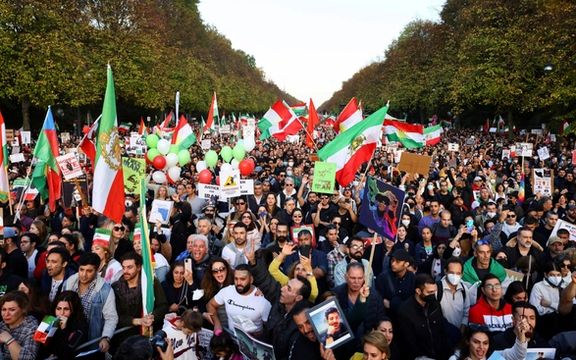
Iranian diaspora is preparing for a Solidarity Rally in Strasbourg to urge the European Union to list the Revolutionary Guard (IRGC) as a terrorist organization.
Thousands of Iranians from all over Europe who have pledged to participate in the Monday rally are passionately discussing ways to get to Strasbourg on social media to send a strong message to the European Parliament that has a plenary session on Tuesday.
Some social media users have urged Syrians, whose country has been a playground for the IRGC, and Ukrainians whose Russian enemy uses the Iranian-made drones against them, to join the rally and support their cause.
An underground alliance of protester groups in Iran has also welcomed and supported the diaspora’s initiative. “We wish to declare our full support for listing [the IRGC] as a terrorist organization by the international community,” United Youth of Iran, an underground alliance of revolutionary youth groups from various Iranian cities, said in a statement sent to Iran International Saturday.
The group has criticized the IRGC’s suppression of protests in Iran, direct and indirect violation of human rights in other countries including Syria and Ukraine, and economic corruption including alleged involvement in drug and arms trafficking and money-laundering by the Guards. “The IRGC’s actions bring nothing but pain, death and corruption to the Middle East and the world,” the statement said.
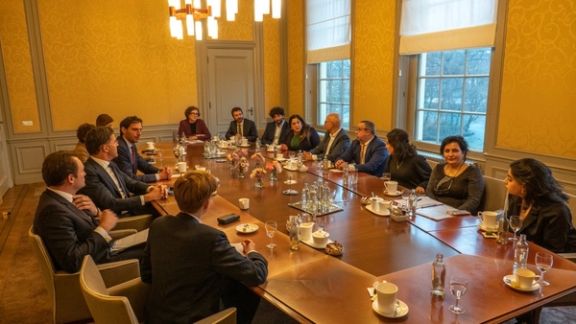
Unlike the United States which in 2019 under President Donald Trump put the IRGC on its Foreign Terrorist Organizations (FTO) list, European countries avoided the designation in the past few years and prioritized diplomacy with the Islamic Republic in the hope of concluding a nuclear deal.
Talks in Vienna to revive the deal, officially known as the Joint Comprehensive Plan of Action (JCPOA) came to an abrupt stop in March 2022, reportedly for Iran’s insistence that the IRGC be removed from the US FTO list. Later talks elsewhere failed to bring about an agreement.
The US and European powers have shown much less interest in a deal following the Iranian government’s heavy-hand suppression of protests in the country in the past few months. As early as October, the US State Department spokesperson Ned Price said the deal was no longer the US government’s focus, and that focusing on supporting the protesters in Iran had taken priority.
News that Iran is supplying Russia with kamikaze drones also angered the West and added to the pressure to get tough with Tehran.
So far over 500 protesters have been killed by security forces, mainly consisting of the IRGC and its Basij militia. Four protesters have been executed so far by the state after hasty trials devoid of any regard for due process. Others are on death row.
Many politicians in France, Germany, and other European countries have been keen to pursue the IRGC’s designation by the EU and say that it has been long overdue.
“Let’s rally together, united, and with a common mind to label IRGC as a terrorist organization. Sanctioning criminals is not enough! We need a resolution! Let's make the world a safer place to live in!” Alireza Akhondi, Swedish-Iranian member of the Swedish parliament who has been campaigning for the EU designation of the IRGC tweeted on January 10.
In an interview with Iran International a week earlier, Akhondi said designation of the IRGC as a terrorist organization should be followed by tracing the organization’s money and blocking its money-laundering channels to weaken it.
Members of the UK House of Commons on Thursday unanimously voted for a motion urging the UK government to proscribe the IRGC by listing it as a terrorist organization.

A Quebec-based company has passed to the government its internal report on how its engines ended up in Iranian-made drones used by Russia in Ukraine.
Bombardier Recreational Products (BRP), best known for water-skis and snowmobiles, said it has established through a “thorough investigation” set up three months ago that an engine found in a shot-down Mohajer-6 drone had not been sold directly to either Iran or Russia.
A company spokeswoman said this week that Bombardier was “in full compliance with all laws and regulations,” but disclosed nothing substantive in public about its investigation. The drone used the Rotax-912 engine made by BRP-Rotax, a subsidiary based in Gunskirchen, upper Austria.
Bombardier ended supplies of the engines to Iran in 2019, although the Mahtabal company in Tehran still markets itself as official representative for Rotax engines. The date – 2019 – suggests this was a response to the United States 2018 introduction of ‘maximum pressure’ sanctions that threatened punitive action against third parties dealing with Iran. The engines, made primarily for recreational use, would not have been covered by a partial United Nations arms embargo on Iran that expired October in October 2020.
‘Unclear usage’
But in 2020, Bombardier also barred sales to Turkey and announced it would stop sending engines to “countries with unclear usage.” This followed reports its engines were used by Turkish-made Bayraktar TB-2 drones deployed by Azerbaijani forces in war with Armenia.
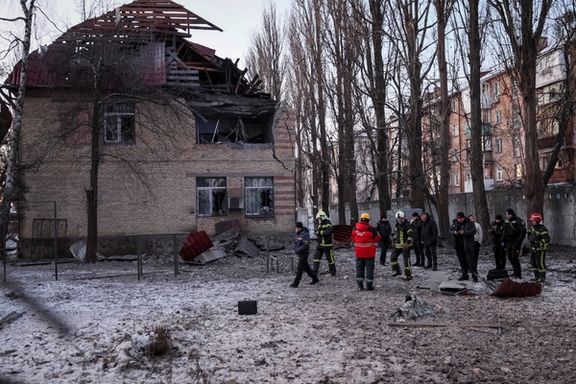
Ironically, Bayraktar TB-2 drones are currently used by Ukraine against Russian forces, while a British defense analyst in November identified from a photograph an engine from a Bombardier jet ski in a Ukrainian marine unmanned vehicle recovered by Russian forces in Crimea.
Whilst media coverage of Iranian-made parts in Russian drones led to outcry from politicians in north America and western Europe, the manufacturers’ reactions reflect the difficulty, and expense, in tracing where sold goods end up. Engines suitable for light-weight drones are cheap and readily accessible, while categorizing equipment as having a potential military application is near impossible. After decades of sanctions, Iranian buyers are adept at sourcing materials and even proud of it – Iran Press News Agency last year reported that the Shaheed-129 drone, “an efficient bird,” used the Rotax-914 engine.
There has been no public report from a US task force – involving departments of State, Defense, Justice, Commerce, and Treasury – launched December by President Joe Biden after the United Kingdom-based Conflict Armament Research said 82 percent of parts in shot-down Russian drones in Ukraine came from US companies. Texas Instruments, whose processors were in the drones, said it compliedwith “applicable laws and regulations in the countries where we operate.”
Dmitri Alperovitch, former chief technology officer at the cybersecurity firm CrowdStrike, told CNN December that while US firms could do more to track their supply chains, end-buyers could easily switch middle-men – creating a “a game of whack a mole.”
‘Inflammatory actions’
Ukraine’s ambassador to Israel said Friday that Israel’s proposed transfer of missile-defense technology had been delayed by the government handover. New prime minister Benjamin Netanyahu, sworn in two weeks ago, has long celebrated a warm relationship with Russian President Vladimir Putin and has argued that any weapons sent to Ukraine would fall into Russian hands and reach Iran.
Both Europol and European Union Home Affairs Commissioner Ylva have warned of the dangers of weapons sent to Ukraine ending up in the wrong hands, with Canada among the countries warning it had no effective means to track them.
Iranian foreign minister Hossein Amir-Abdollahian is due to meet Russian foreign minister Sergei Lavrov in Moscow January 17 – a meeting the Russian foreign ministry has said will focus on boosting trade. In an interview with Izvestia published Thursday, Iranian Ambassador Kazem Jalali repeated Tehran’s official line that while the root of the Ukraine crisis was “inflammatory actions of Nato,” there was no way forward in military confrontation.
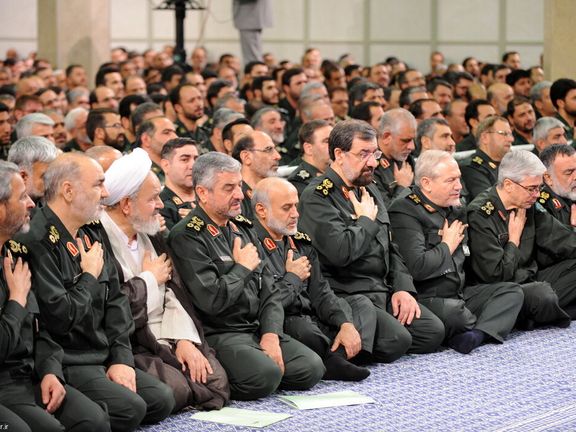
As international consensus over designating Iran’s IRGC as a terrorist organization is growing, over 100 members of the European Parliament call for proscribing the Guards in its entirety.
In a Thursday letter to Josep Borrell, the EU High Representative for Foreign Affairs and Security Policy and European Commission Vice-President, the signatories also urged the EU to expand its sanctions list with Supreme Leader Ali Khamenei, President Ebrahim Raisi, Prosecutor General Mohammad Jafar Montazeri and other individuals responsible for violations of human rights.
They also want coordinated efforts to facilitate measures to ensure the safety of the Iranian diaspora in the EU and restrict the access of sanctioned Iranian individuals’ family members to European facilities such as universities.
In the letter, they also asked Borrell to clearly communicate that further executions of Iranian protesters would lead to additional restrictive measures, including economic sanctions.
Stressing the necessity of the correct application and enforcement of the sanctions regime, they emphasized on the Islamic Republic's “despicable role” in the Russian invasion of Ukraine by supplying arms and other means of support. “This fact has to be taken into account, as Iran is thus aiding a criminal Russian state, which keeps on terrorizing the people of Ukraine through relentless bombing of civilians and critical infrastructure,” they said.
Moreover, according to draft documents seen by POLITICO, the EU is considering fresh sanctions against nearly 40 Iranian individuals and entities. There are overall 27 EU documents which are called an “evidence pack,” as they include the information — mostly press reports — backing up the proposed sanctions.
There are 17 people the EU is thinking of sanctioning, including regional governors, a lawmaker, a minister and a top official at the state broadcaster (IRIB) World Service, as well as several current and former officials in the IRGC over their key role in the government’s repression. The list also included Sports Minister Hamid Sajjadi Hazaveh, who the document says is “responsible for pressurizing Iran’s athletes into silence, to prevent them from speaking out internationally against repression in Iran.” “He was personally involved in the case of Elnaz Rekabi, an Iranian athlete climber that competed without hijab at the Asian Championship rock climbing competition in the fall of 2022,” read the document.
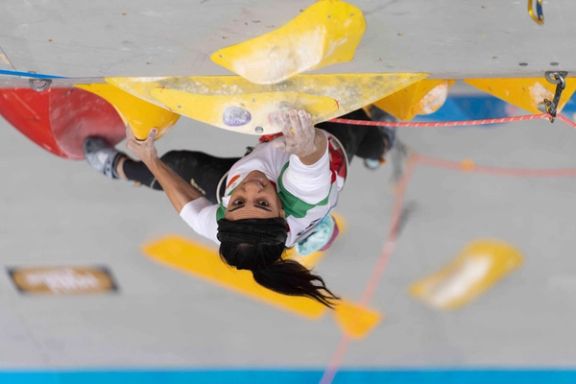
About 20 entities are also on the list, including Iran’s Communication Regulation Authority (CRA), which “enforces the Iranian government’s requirements to filter Internet content through a spyware called SIAM” and the Ravin Academy, a body that has trained hackers “involved in directly disrupting the communication of those protesting against the Iranian regime.” Twelve regional corps of the IRGC are also included.
EU countries — led by Germany, France and the Netherlands — have separately been discussing whether to go ahead and label IRGC a “terrorist organization.” German Foreign Minister Annalena Baerbock tweeted in support on Monday, saying the move “is politically important and makes sense.” France has also kept the door open to the idea.
The United States has already designated the IRGC as a terrorist group and the UK is set to follow suit soon, as members of its House of Commons on Thursday unanimously voted for a motion that urges the government to designate IRGC as a terrorist organization.
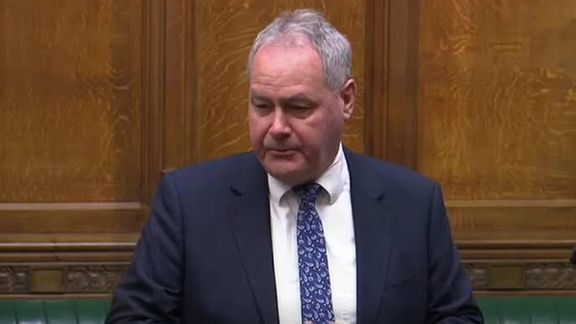
Members of the UK House of Commons on Thursday unanimously voted for a motion that urges the UK gov't to proscribe Iran's IRGC as a terrorist organization.
While the vote is not binding, it indicates British lawmakers' increasing pressure on the government to respond to violence against protesters in Iran by security forces mainly controlled by the Revolutionary Guard.
So far, a combination of IRGC personnel, their Basij militia, intelligence agents and regular police commanded by top IRGC generals have killed around 500 civilians and maimed hundreds of people. Four protesters have also been executed after sham trials.
Opening the discussion, Bob Blackman, a member of the ruling Conservative Party, said the IRGC should be added to the list of proscribed terrorist organizations.
"I urge UK government to proscribe IRGC as terrorist organization and work with counterparts to ensure further sanctions on Iran without delay... Suppression of speech against Iran's regime mimics the rise of the Nazis. We must act before it reaches such level."
Blackman said that the UK should “refer the [Iranian] regime’s appalling dossier of systematic violations of human rights and crimes against humanity to the United National Security Council for adoption of binding and deterrence measures.”
The IRGC should be proscribed “in its entirety,” Blackman added, echoing the words of then United States Secretary of State Mike Pompeo who announced the US listing of the IRGC as a ‘foreign terrorist organization’ as part of its ‘maximum pressure’ sanctions against Iran when the US in 2018 left the Iran nuclear agreement of 2015, the JCPOA (Joint Comprehensive Plan of Action).
‘A bunch of clerical fascists’
John Cryer, a Labour MP, called the IRGC “a bunch of clerical fascists who rape, kill, maim their way around Iran and outside Iran's borders.” Conservative Bob Stewart said that “if any of us were to make a speech like we've made this morning or this afternoon in Iran, we’d be dead meat very quickly.”
Labour MP Fleur Anderson said the UK should offer visas to female Iranian protest leaders and those given death sentences. John McDonnell, close associate of former Labour leader Jeremy Corbyn, called for closing the Iranian embassy and expelling Iranian diplomats.
The push in Europe to list the IRGC as a terrorist organization goes beyond the UK. Many German and Austrian politicians are keen to pursue the issue with the European Union, which will probably discuss it in a meeting next week.
Foreign Office minister Leo Docherty told MPs the IRGC was “already sanctioned as an organization,” as were some of its individual members, although it was not proscribed as a terrorist organization. Docherty said government consideration of the issue was “active” and refused to “pre-empt any formal announcement…”
A report to government from Jonathan Hall, a King’s Counsel, highlighted some of the issues involved in proscribing part of the armed forces of a sovereign state, Independent Online reported Thursday. Hall warned given the state is conventionally considered to “enjoy a monopoly over the legitimate use of violence,” this would “depart from consistent and decades-long UK policy.”
‘Upsetting the settled meaning of terrorism’
British legislation and implementation derives from the 2020 Terrorism Act, which defined terrorism as “serious violence against a person” or “serious damage to property” designed “to influence the government, or an international governmental organization or to intimidate the public” based “on a political, religious, racial or ideological cause.”
While Hall’s arguments rest on the difficulties of extending legislation based around non-state organization to state bodies, Amnesty International has long argued that the ‘terrorism’ definition is itself unworkable, and that its vagueness and breadth leave “scope for political bias in making a decision to bring a prosecution.” The UK’s current list of 78 proscribed terrorist organizations includes Hamas, Hezbollah, and the Kurdistan Workers Party (PKK). Listing, which is done extrajudicially by the interior minister (home secretary) makes membership, giving financial support, or displaying the group’s logo or flag a criminal offense. The MEK was removed from the list in 2008.